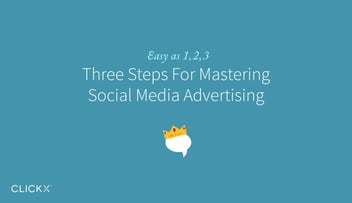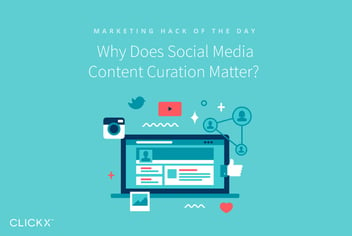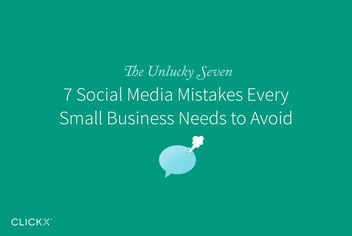5 Reasons Why Facebook is Bad For Small Businesses
Since Facebook’s launch just over a decade ago, it has become synonymous with the words ‘social network’. When considering social media, it is the first name to pop into your head, and with 1.44 billion monthly active users reported in March 2015, Facebook seems like the ultimate haven for brands in terms of potential audiences.
[Tweet “The golden age of promoting your brand on Facebook has now passed.”]
Unfortunately, the golden age of promoting your brand on Facebook has now passed, especially if you’re a small business owner. It has become increasingly difficult to reach that audience through the platform and even if you do manage it, getting them to engage is a whole other struggle. If you gain any customers or visitors to your site as a result of Facebook, chances are you will wonder if the time, money and effort were worth it in the end.
In this post we will explain why Facebook is so difficult for small businesses and why it may be more effort than it’s worth.
1. Facebook isn’t Cheap
While it is easy and free to set up a Facebook Page for your business, this is not enough if you want to make the most of the platform. You need to actively promote your page if you want to gain exposure to a new audience, and this is where it gets difficult.
You can purchase Facebook ads, which point users towards your page and charges you for the engagement. It would then stand to reason that those new followers count as your audience and will receive your updates in their news feed, right?
Wrong. Only a small percentage—maybe 1% to 5%—of people who have liked your page will see your updates. To get a wider reach, you will need to splash out more money. This can range from $5 to $300 to reach 500 to 50,000 people; not just your fans. Remember that ‘reaching’ these people will only put your ad into their newsfeeds; there is no guarantee that they will click or even see it. Actual engagements can then prove expensive, sometimes reaching $12 each—far too expensive considering advertising alternatives.
Unfortunately, it seems that Facebook ads are catered more to huge companies with lots of money to spend.
2. You Need Dynamic Content That Catches The Eye
Of course, you can’t just promote a photo or status update on Facebook anymore. It will be washed away in a sea of eye-catching content, the most prominent of which is automatic-playing videos.
While it is possible for huge brands and corporations, creating bright, vivid video content is unlikely to be high on the agenda (or within the budget) of many small businesses. Unfortunately, if you want large amounts of engagement on Facebook, video is now the only way to do this with significant results. Newsfeeds are built with psychology in mind, and sudden movement from an auto-playing video is always going to draw the eye from the static content.
3. Facebook’s Algorithms Don’t Favor Brands
If you’ve navigated the tricky and costly process of ads and created exciting content that will catch the eye of the user, don’t think that’s it’s smooth sailing from now on in.
Facebook recently announced a new algorithm that trumps the content shared by a user’s friends over any advertising or branded content. As a part of this, they warned brands that their “post reach and referral traffic could potentially decline”, though something tells me this could be understated somewhat.
4. Facebook is Constantly Changing
If you’ve been an active Facebook member for some years, you will have noticed that the appearance changes almost as much as an award show host’s outfit. As a result, even if you’ve managed to leap over all the hurdles to get people engaging with your business’s page and content, that could change at any moment.
Facebook places heavy emphasis on user feedback when developing their algorithms, interface and apps. This means that change is always just around the corner, which is not a stable basis on which to build a social media strategy.
5. Fewer People Are Using Facebook (And If They Are, It’s Not for Brands)
Let’s face it: Facebook is no longer the kingpin that it once was. While it remains the biggest social network in terms of monthly active users, figures are steadily declining. In fact, in 2014, Facebook was the only one of the eight biggest social networks to see a drop in active users. Tumblr and Pinterest saw 95% and 97% increases, respectively.
It’s not just the number of users that are dropping. Further statistics showed that:
- 40% of active users regularly browsed but never posted anything.
- 50% said they spent just 1-5 hours a week on Facebook (compared to 37.5% the previous year).
- Only 43.1% could see themselves using Facebook more in the future.
These are just the basic statistics. When we look into the numbers concerning promoting a business on Facebook, over 80% of users said that they either rarely or never click Facebook ads, while 32% said that promoted posts should not exist.
There’s no denying that those numbers are not at all favorable to anyone looking to take out advertising space within Mark Zuckerberg’s empire. However, if you were considering Facebook for your business, see these numbers as a positive: you won’t be wasting your time and money on a platform that is losing steam.
Other Social Networks That Are Much Better For Small Businesses
As small business owners are turning away from Facebook, other social networks are much more appealing thanks to relatively low-maintenance and user friendly methods for advertising:
- Twitter is home to a lot of companies and brands, and people know that it is a reliable place to turn for the latest updates. Paid advertising on Twitter is simple: you put money behind a tweet and tailor your audience, only paying for the engagements that you get.
- LinkedIn is often seen as more of an online resume, but it’s useful for connecting with your audience in a more professional capacity. For small businesses, it’s a good platform to establish yourself as an expert in your field. Ads and sponsored updates are available and commonplace for businesses.
- Google+ often gets a bad rep, but the reality is that a well-built presence on the platform can boost search engine results and drive visitors to your website.
- Tumblr and Pinterest are both growing massively, as we have seen, but these are not used as much for advertising. They are better for visually showcasing your business to an established audience.
Conclusion
While Facebook still seems like an impressive potential audience waiting for your business, the time, money and effort required will not see a worthwhile return.
Facebook favors big brands that are able to give grand displays which draw in hundreds of thousands of likes. Though as we’ve seen, even the big brands’ days on Facebook may be numbered as algorithms change and user figures drop.
For small businesses, social media is an essential part of an online strategy. However, as many small businesses may be limited in resources, they need to make sure they focus their efforts to get the maximum ROI.
As we’ve seen, Facebook is not the platform for this. A small business owner’s efforts are probably much better invested in other social networks.
As a small business, what are your experiences with using Facebook? Let us know in the comments below!











